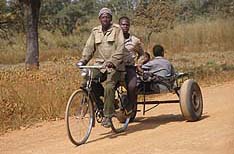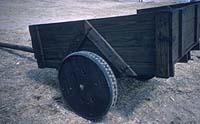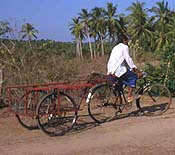|
| Projects
need to undertake regular, self-critical and participatory evaluation
of progress. They should react to unforeseen situations and problems,
and be prepared to change direction to achieve greater impact. |
 An innovative and 'spontaneous' use
of a
An innovative and 'spontaneous' use
of a
cycle trailer in Guinea |
|
Training artisans was not
enough
The Katopola Agricultural
Engineering Centre near Chipata in Zambia provided services relating
to vocational training and rural structures. During the 1980s, donor
agencies provided nine years' funding including expatriate personnel.
School leavers and rural carpenters were taught how to make wooden
ox carts, push-carts, wheelbarrows and farm implements. However,
there appeared no demand for these, and the carpenters went into
furniture production and house carpentry. The project aimed (among
other things) to assist rural transport, but despite almost a decade
of activity, it had no impact on transport.
|
|
 Heavy, wooden carts with wooden bearings
proved unpopular in Zambia
Heavy, wooden carts with wooden bearings
proved unpopular in Zambia |
- The project had predetermined the
wooden technologies to promote. Although the designs were not
adopted, alternative technologies were not offered.
- The project addressed one perceived
problem (artisan training) but did not assist production or marketing.
- The project did no identify and
address the problems causing the lack of adoption of the technologies
being promote
|

Cycle trailer in Sri Lanka
|
|
Evaluation lessons from cycle trailers
promoted for women in Ghana
In 1991, subsidised cycle trailers
were promoted in Northern Ghana. Credit was provided through NGOs.
Participants were said to be 'ecstatic'. Workshops in Tamale started
production. In 1994, the programme was evaluated. Women reported
that cycle trailers were expensive and sales were minimal. Women
did not generally use cycles. Strong women's cycles were not available.
On the roads, market trucks were used. On footpaths, the trailers
did not work well. The trailers were not strong enough for large
loads. If loaded, the trailers were heavy to pull. Ordinary bicycles
were capable of carrying significant loads and were very flexible
at half the price of a cycle/trailer combination. The evaluation
revealed that trailers had been promoted as a solution without clear
understanding of the social, economic and technical problems and
gender issues.
|
|

